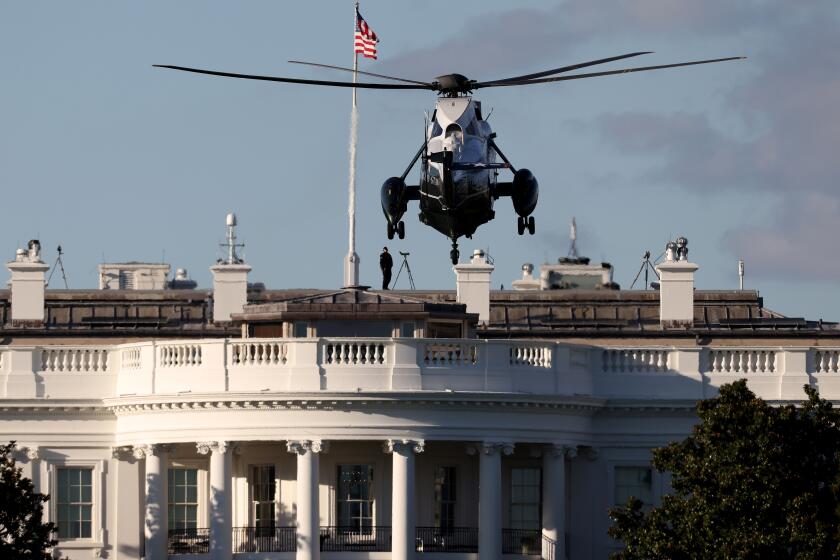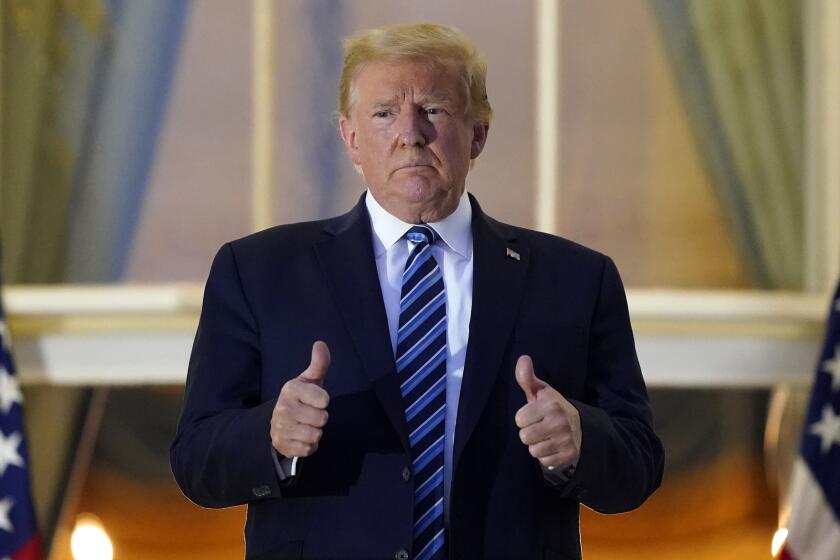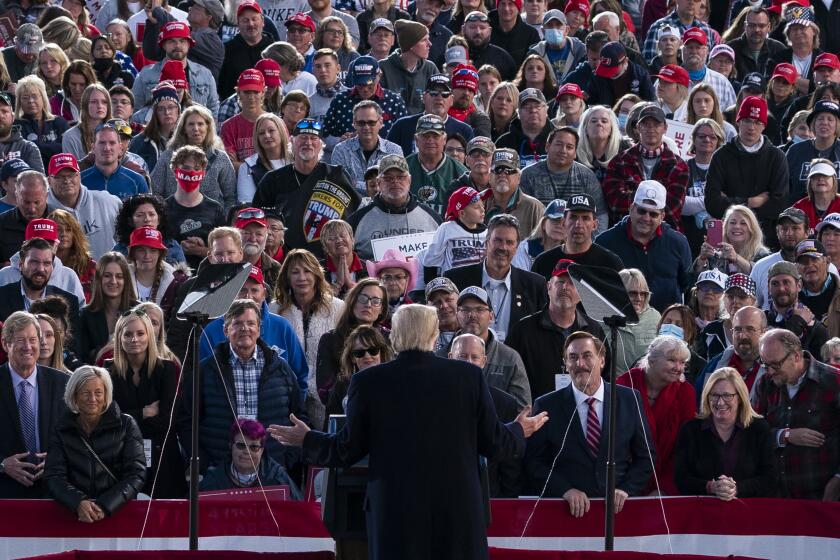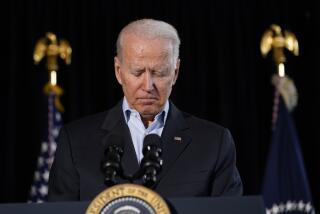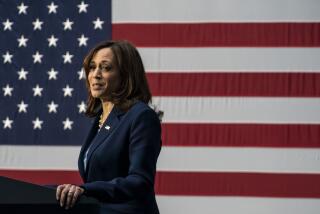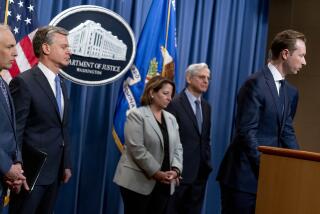Why won’t White House say when Trump last tested negative?
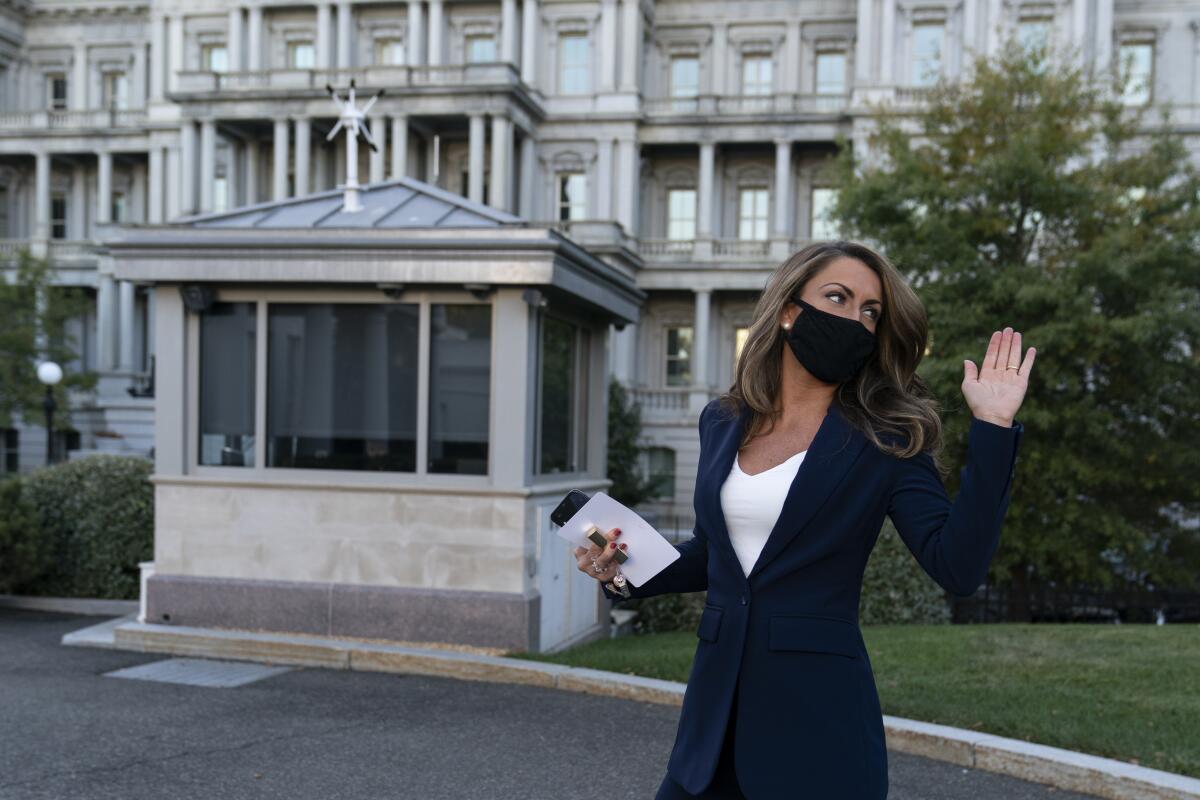
- Share via
WASHINGTON — It is a basic, crucial question and one the White House refuses to answer: When was President Trump’s last negative test for the coronavirus before he tested positive last week?
“Yeah, I’m not going to give you a detailed readout with time stamps every time the president’s tested,” White House Press Secretary Kayleigh McEnany told reporters last weekend.
“I can’t reveal that at this time,” echoed Alyssa Farah, the White House director of strategic communications. “Doctors would like to keep it private.”
“I don’t want to go backwards,” said Dr. Sean Conley, the president’s physician.
The answer could help fill in vital details about the course of the president’s illness as well as when he may have been contagious and whom else he may have exposed. And the White House refusal to answer makes it hard not to wonder what they’re hiding, given other details they’ve shared.
President Trump will spend the next several days at Walter Reed National Medical Center for treatment of COVID-19.
“At this point it’s just so strange that they’re unwilling to give us the information,” said Dr. Michael Joseph Mina, a physician and professor of epidemiology at Harvard’s school of public health. “It makes people start thinking things like, ‘Was the president the super-spreader?’ … If there was no nefarious activity going on, then they should have no problem answering this question.”
The information is also key to tracking who else may have been exposed to the virus so their contacts can be traced to prevent new clusters of infection.
“Then you can get an idea, potentially, of when he was infected, how long his incubation period was, and also then evaluate who may have been exposed to him over that time frame,” said Dr. Benjamin Pinsky, medical director of the clinical virology laboratory at Stanford Health Care. Though considerable variability exists among coronavirus cases, he said, Trump was most likely infectious several days before he tested positive — a period during which he traveled and had close contact with dozens of people.
Senior White House staffers and those who are in direct contact with the president are tested for the virus daily. The White House originally gave the impression that Trump, too, was tested every day, with McEnany claiming in July that Trump was “the most tested man in America” and tested “multiple times a day.” But Trump contradicted her, saying, “I do probably on average a test every two days, three days.”
The current White House line is that Trump is tested “regularly.”
Trump is back at the White House after staging a dramatic return from the hospital. He has been receiving an unprecedented level of care for COVID-19.
Here’s what is known: On Wednesday, Sept. 30, during a trip to Minnesota for a fundraiser and rally, one of the president’s closest aides, Hope Hicks, began feeling ill. She isolated herself aboard Air Force One during the trip home, but the White House appears to have taken no further action.
The next morning, Hicks was again tested for the virus. This time, the results came back positive, just as the president was about to leave for a fundraiser at his golf club in Bedminster, N.J. A frantic effort was made to swap out staffers who had been in close contact with Hicks, including McEnany. But Trump, who had also been with Hicks, nonetheless boarded Marine One, along with other White House staffers still in the dark about Hicks’ diagnosis.
After returning home from Bedminster, Trump was administered a rapid test, followed by a more accurate confirming test, which takes several hours to process. Both came back positive.
“Safe to say, his first positive test was upon return or at least after Bedminster,” McEnany said.
But had Trump been tested before he made that trip to court donors in New Jersey after Hicks fell ill?
Had he been tested before he traveled to Minnesota?
President Trump has alarmed Jewish leaders by appearing to endorse ‘racehorse theory’ — used by eugenicists and Nazis last century.
What about the previous day, before his first debate against Democrat Joe Biden in Cleveland? The Cleveland Clinic, which co-hosted the event, required that all attendees be tested in advance. Campaigns had to “certify” that their candidates and traveling staff had tested negative within 72 hours of the debate. “Each campaign complied with this requirement,” the clinic said in a statement.
White House spokesman Brian Morgenstern, however, refused Friday to confirm that that was the case in an appearance on MSNBC.
“The president’s doesn’t check all of his HIPAA rights at the door just when he becomes president,” Morgenstern said, referring to the Health Insurance Portability and Accountability Act, which was written to prevent doctors and others who bill for insurance coverage from disclosing a person’s medical information without their consent.
Was Trump tested Monday, Sept. 28, before he held a photo op with a truck on the South Lawn and a Rose Garden news conference to trumpet coronavirus testing efforts? What about before a debate prep session with his campaign manager, Bill Stepien, and former New Jersey Gov. Chris Christie, who have both since tested positive?
What about Sept. 27, when he visited his golf course in Sterling, Va., held a late-afternoon news conference in the White House briefing room and hosted an evening reception for Gold Star families on the White House state floor? Adm. Charles W. Ray, the vice commandant of the Coast Guard, who was in attendance, has since tested positive, forcing the nation’s top military leaders, including the chairman of the Joint Chiefs of Staff, into self-quarantine.
What about Sept. 26, before he held a Rose Garden ceremony announcing his next pick for the Supreme Court, complete with closed-door receptions where few wore masks? Numerous attendees have since tested positive following the suspected super-spreader event.
Could Trump have been contagious that day? Could he have been the spreader?
Dr. Albert Ko, an infectious-disease specialist and department chairman at the Yale School of Public Health, noted that a small proportion of people infected contribute to the majority of infection, with about 20% of people responsible for 80% of transmission, studies show.
While it’s unclear if Trump did indeed spread it, Ko said, “trying to identify people and when they could be infectious is important, especially when they are in contact with a lot of other people.”
Added Saskia Popescu, an infectious-disease epidemiologist at George Mason University, “There is concern that he continued to engage in public activities after his initial positive test, which is deeply worrisome and frankly unethical.”
More to Read
Sign up for Essential California
The most important California stories and recommendations in your inbox every morning.
You may occasionally receive promotional content from the Los Angeles Times.
